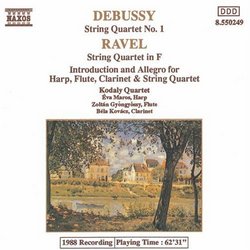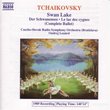| All Artists: Claude Debussy, Maurice Ravel, Kodaly Quartet, Éva Maros Title: Debussy, Ravel: String Quartets Members Wishing: 0 Total Copies: 0 Label: Naxos Original Release Date: 1/1/1990 Re-Release Date: 2/15/1994 Genre: Classical Style: Chamber Music Number of Discs: 1 SwapaCD Credits: 1 UPC: 730099524926 |
Search - Claude Debussy, Maurice Ravel, Kodaly Quartet :: Debussy, Ravel: String Quartets
 | Claude Debussy, Maurice Ravel, Kodaly Quartet Debussy, Ravel: String Quartets Genre: Classical
|
Larger Image |
CD DetailsSimilar CDs |
CD ReviewsA SUPERB RECITAL Melvyn M. Sobel | Freeport (Long Island), New York | 01/31/2001 (5 out of 5 stars) "This is one of the most atmospheric, poetic performances I've heard in a long time, bar none. Tempi are judged just right, as in the opening "Anime" of Debussy's Op. 10, where the Kodalys rather slide right in and grab you, or the gorgeous "Tres lent," from Ravel's Quartet in F, that becomes almost spiritual. There is no spotlighting or highlighting of the impressionistic elements that run through these works; instead there is a nexus, a convergence. The Kodalys opt to infuse a wealth of humanity, a pinch of delicious angst, and a whole lot of sheer verve that, in the end, adds a unity and presence to music we only thought we knew. Hearing the Kodaly Quartet play these works is like listening afresh. As well, they are extremely fine instrumentalists, gifted with impeccable intonation, keen sensitivity, and an inspired committal to the music. Through them, these quartets sigh, lament, breathe, dance. [The Naxos engineers have given the Kodalys an intimate sound picture to match their artistic conception, as well.] The addition of Ravel's Introduction and Allegro for Harp, Flute, Clarinet and String Quartet complements this already superb bargain. [Running time: 62:31]" Deeply Beautiful Kevin Currie-Knight | Newark, Delaware | 07/11/2002 (5 out of 5 stars) "Although this is the first Debussy/Ravel quartet CD I've owned, it's not the first I've heard- the others being from the Julliard and Tokyo quartets. This is on the level of Tokyo's playing but three things make this, the Kodaly recording superior. First and most obvious, this one is less expensive. Second, the Kodaly quartet handles the music with more delicate gloves than does Tokyo. Third, the Intro and Allegro for Harp, Flute, Clarinet and Quartet serves as a great end-piece here. (the solo harp section is so pretty that the first time I heard this, I played and rewound 7 times.) These quartets are deeply beautiful, the recording is great, and the playing is replete with the alternating jumpiness/lament moods so fitting with this music. At some point, I will likely buy other recordings of the quartets, but this will be the standard I measure them by." Hidden Treasure Leslie Richford | Selsingen, Lower Saxony | 03/25/2005 (4 out of 5 stars) "Coming as I do from the early music scene, listening to Debussy and Ravel was something of a shock when I first attempted it, and that explains why I originally chose the title "Difficult Music" for this review. However, after further listenings, I decided to change this to "Hidden Treasure": this CD contains some really fascinating music - very different in style from earlier chamber music, yes, but full of fascinating effects and with the remarkable quality of "growing on you", i. e. sounding more logical and, partly at least, more beautiful the longer you listen. Although I still slightly prefer the Emerson Quartet, the Kodaly Quartet on Naxos really do a fine job here, it probably being more the engineering than the playing that makes me prefer Deutsche Gramophon's offering. The "encore" of the Introduction and Allegro for Flute, Clarinet and Harp is quite an amazing piece of music with some delicate harmonies that really send chills of delight down my back, so to speak: the Naxos disc is definitely worth purchasing for this piece alone! (This addition to the original review was added on 22 April 2007, I will leave the original text as it stands as a testimony to the fact that it takes time to come to appreciate this music.)
The string quartets by Debussy and Ravel (each composer wrote only one) were penned in 1893 and 1902 respectively and are by far the most difficult music that Naxos produced in its early years (this CD was recorded in December 1988), for even after listening to this many times it is still not easy to perceive anything like melody. Debussys quartet is often characterized as an immature work based on traditional structures, but for me it is the sheer modernity of the work that hits me again and again, with the juxtaposition of modes and shifting variations of themes taking obvious priority over anything vaguely resembling tunefulness. Ravels quartet is known to have been written under the influence of Debussy's, but is a little easier to listen to, although there is certainly nothing here that would inspire anyone to hum along! After repeated listenings, I found myself enjoying above all the rhythmic structures, but these are far more potently captured in the 1986 recording by the Emerson String Quartet, which has a grace and brilliance which the Hungarian Kodály Quartet cannot match and the advantage of Deutsche Grammophons superior sound. Debussy, Ravel: Streichquartette The Naxos CD is no doubt good, deserving its three-star rating in the Penguin Good CD Guide, but if price is no object, the Emerson recording is, to my mind, unbeatable. Where the Naxos scores as over against the yellow label is the inclusion of Ravels Introduction and Allegro for Harp, Flute, Clarinet and String Quartet, a piece which I had never heard before I bought this CD but which deserves to be heard more often. Apart from the fascinating harp passages, this music seems to be based on the rather unusual sound combination of flute and clarinet and will reward repeated listenings." |

 Track Listings (9) - Disc #1
Track Listings (9) - Disc #1